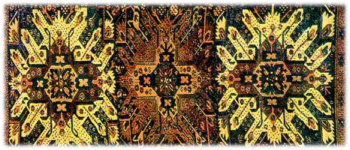Editors Note: This story was written by a friend and someone who I worked with my first year in Armenia. Troopers both, Jane and her husband Allen survived the winter of 1992 and the politics of AUA to return several times to teach, research, visit and now to set up an NGO to preserve domestic architecture. The story is wonderful, and thankfully, it ilustrates a time long past. Buying and exporting carpets are much easier now, though petty corruption continues. ____________________________
It was the 10th of June, Jane and Allen's 20th wedding anniversary. The Vernissage art market had just moved to their neighbourhood. They wandered about amongst the stalls. Although she wasn't looking for a momento, Jane stopped to look at a large pale pink carpet. The owner assured her it was made in Karabakh and that the tatters and patches did not detract from its worth. "It's very old," the seller said, pointing to a date embroidered along the edge: 1906, 10th June. Jane was astonished. They discussed the price and a few minutes later, bearing the rug between them, 32 000 roubles lighter in the pocket, they carried their anniversary gift home. They laid it down in the kitchen. It was a ratty thing, a little too big for that room.
Although there were several weeks before they would leave, Jane's thoughts had moved to the journey home. Rumours abounded about the transport of arts and crafts from the country. "Smuggle them out, no one will look" was the most popular response. Jane was adamant: there was enough corruption in the country without her participating in it. She would follow the legal channels.
Bella checked the procedure with the Ministry of Culture. "Take two photos of the carpet, colour, black-and-white, it doesn't matter. Take these, and your passport, to the fourth floor at 11 o'clock on Monday. We will make an appointment for you to have the item evaluated on Tuesday." The carpet was big, it wouldn't fit easily on one snapshot. "No problem, arrange it how you can." Jane took some snaps: a piece of the carpet where it was torn and badly patched, a general view of a large chunk of the carpet, and a piece that had the date and the seamstresses name embroidered on it.
On Monday Jane and Bella arrived at the Ministry and made their way to the fourth floor offices. They waited, and they waited. At last, one of the many women, each sitting at a phone which hadn't rung, and probably couldn't ring, deigned to look up. "Not here," they were told. "Sixth floor."
They arrived in a large bare room with a blonde wood floor. A few wobbly-legged tables hung around the walls. Americans with translators scratched on flimsy sheets of paper, describing themselves and their treasures, and a heavy set woman with a thick mass of henna-dyed hair and a gold tooth entered the details, carefully numbered in order of receipt, into a ledger. This ledger would set the order for inspection the following day. She looked at the "letter" bearing Jane's Armenian name, passport number and destination. "These photos are no good. I must have two." "But you have three," said Jane. "Two the SAME. And of the WHOLE carpet." Was everything else in order? Yes, no problem.
This would take some time. Jane and Bella would try again the following week. During the week, Allen hung the carpet from the apartment window, whilst Jane went down below to take a colour photograph of it in its entirety. The roll was swiftly developed (thank goodness the photo store had some power during the week) and the adventure began again the following Monday.
"This photo is not supposed to be in colour," the clerk insisted. Well why hadn't they said that last week when then inspected the previous colour photos? The rules had changed. Their documents could only handle black and white photos. And what is the size? Chee-ky-dem. (I don't know.) Jane guessed the size. They would let her get away with the colour photos this time. No, Jane wouldn't do it again.
Jane's name was entered on the second page of the ledger, fairly early in the roster. She should arrive at eleven the following morning - with her carpet and sufficient money to pay 5% of the official value of the carpet. How much would that be - it only cost 32 000 roubles? The purchase price is irrelevant. Your great-grandfather may have bought a van Gogh for $20, but it would certainly not be worth that little today. Yes, but a raggedy old carpet is hardly a van Gogh. Yes, but we have serious inflation...
By eleven, a crowd had assembled in the foyer of the sixth floor. Jane walked into the inspection room. Carpets were laid about on the floor. She was shoo-ed right out and told her name would be called. A long tiresome wait ensued. There were no chairs in the lobby, where presumably, week after week, hordes of travellers and art enthusiasts gathered to wearily wait. People lounged on their carpets, stuffed in plastic bags or canvas sacks, or rolled and tied. They leaned against their paintings tied in bundles. And they waited. The lobby was dingy without electric lights. As each new group arrived on the landing, they made their way to the hall, entered, and were rudely and angrily ushered out.
Some people would arrive, walk right in with their bundles, and a few minutes later, would walk out again with valuation certificates in their hands. By noon, some of the clients, Jane amongst them, felt thoroughly ignored. A man stormed into the hall. "You could work faster. You just go as slowly as you please. And you just see your friends and your relatives!" The angriest of the clerks pushed him into the hallway and a great shouting match began. Tension was high. For surely, if you irritate the evaluators will they push up the price of your carpet? Then again, if some of the people were dealers, perhaps they would want the products' value increased. Perhaps, maybe, it makes no difference if you're rude. Bella asked when it would be their turn. You'll be the third, she was told.
The wait continued. It was nearly one o'clock. Not one person who had been there at eleven - apart from Jane and Bella - was still there. People were still pushing at the door. Some were being seen. At least a dozen people had been in since Jane's "third place". "Bella, ask her how much I have to give her to be seen," said Jane in frustration. "I am deeply offended that you asked that," the clerk huffed, slamming the door as she re-entered the hall. "Well that just pushed your price up ten thousand roubles," said Bella.
But like a nettle sting, it ended, and after two hours of waiting, Jane was asked to come and have her carpet evaluated. She picked up her pack. Bella, in her anxiety, picked up the neighbour's pack. They entered the room. The carpet was laid out. How ragged it looked, but as if it were already a great treasure, the evaluators stepped gingerly around it. They did not walk on it. In fact they hardly looked at the carpet. All they were interested in was the inscription. 10th June, 1906, and the name of the author, Satinik Toumanian. "This carpet has writing on. It cannot be taken out of the country." It was tattered, but its history was traceable, so it became priceless. This seemed to be the rule, and yet it was not definitive. Jane and Bella were asked to wait outside while the point was discussed. Ten minutes later they were re-summoned. No, this carpet could not be taken from Armenia, not at any price. In fact, they would not evaluate it.
So what now. Jane considered the options. She could cut off the writing and have it evaluated for export. Then it would be worth nothing. She could then smuggle the writing out of the country and stitch it back on in the States. She could smuggle the whole carpet out of the country. She could give it away or sell it. "Would the History Museum be interested in it?" Oh certainly, but they have no money for such purchases. It could be donated, and a little inscription would be made as to its purchaser. This option didn't appeal.
A commissioner beckoned to Jane. He would buy it. How much had it cost? 32 000 roubles, said Jane. 35 000, said Bella. Sold. He peeled off a 50 000 rouble note from a thick wad and counted out the change on an abacus. Jane handed over the carpet, put her empty backpack on her shoulders and walked away.
Why that thick wad of roubles? He must plan for this. They evaluate items so highly than people can't, or don't want to, pay. He buys the product. Or the item, like Jane's, is priceless and the honest Americans who feel they cannot smuggle, sell them there and then. The fellow, probably a dealer from Boston, will ship Jane's carpet to France and sell it in a Left Bank boutique for 50 000 francs.
Jane looked about her as she left the building. This was Armenia's cultural heritage? Someone had thrown a burning match into the ash bin, and something smoky and smelly was filling the room. In the States the alarm would have gone off and everyone's precious paintings would have been soaked by the sprinkler system. The lift didn't work (luis k-char) so they stumbled down the darkened stairwell, Bella clutching her face on which a large abscess was starting to throb. As they walked onto the street they saw a garbage fire blazing up against the building wall. Jane was tired of it all. She didn't even feel the satisfaction of carving the carpet up into shreds in the face of bribery at the airport.
Meanwhile, Allen had to be told he didn't own a carpet anymore. He felt quite sentimental about it. Jane was straightforward. She handed him the fifty thousand rouble bill. It was prettier than the carpet, much lighter to carry home, and would hang more easily on the wall. What's more, national heritage notwithstanding, it too bore the date: 1993. Somehow, though, it wasn't as romantic.




